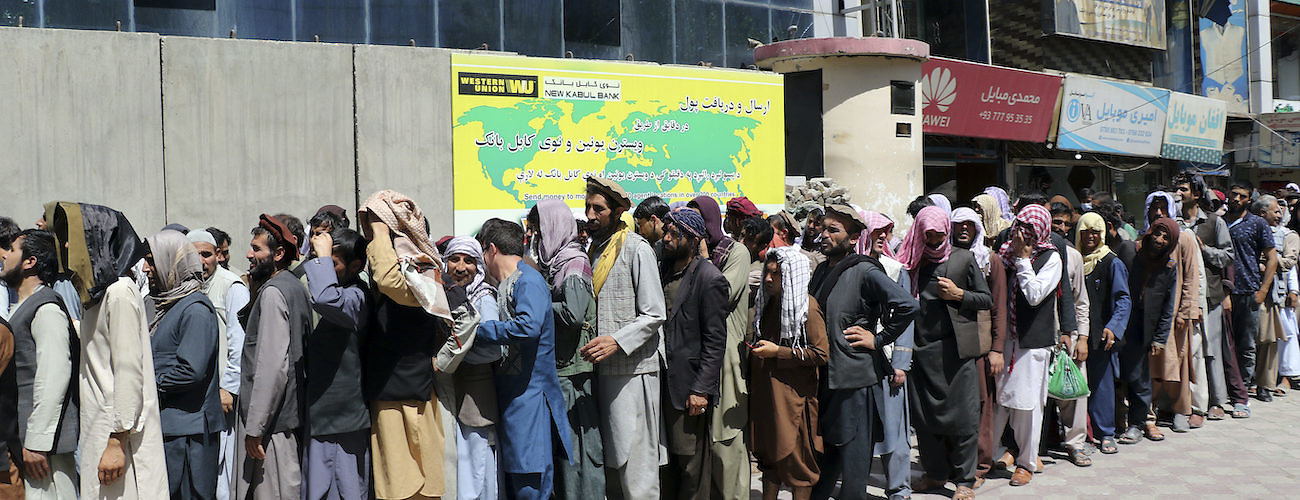Afghans wait in front of Kabul Bank, in Kabul, Afghanistan, Wednesday, Aug. 25.2021. (AP Photo)
With the end of the withdrawal and evacuation from Afghanistan, two major issues confront US policy. First is how to meet mounting humanitarian needs and save the social development programs that have benefited Afghan women—one of the few positive outcomes of the intervention. The second is how to guard against Afghanistan becoming a haven for global terrorists.
These issues are linked to the question of whether and under what conditions the United States (US) and the United Nations (UN) might consider formally engaging with a Taliban-led government, a prospect that is fraught with practical, political, and moral hazards. Offering to engage, however, could provide strategic leverage to deliver needed aid and save development programs, while providing assurances for the prevention of terrorism.
This dual challenge of humanitarianism and counterterrorism does not rest with the US alone. The G7 allies have expressed a clear desire to see their own development, agricultural, medical, and social projects in Afghanistan continue. The United Nations Security Council and the secretary-general have stressed the importance of the Taliban adhering to international norms. Pakistan, China, and other neighboring states have an interest in a more stable Afghanistan.
The Taliban-led regime urgently needs international acceptance and the economic benefits that would flow from the suspension of international sanctions. Approximately 80 percent of the former government’s budget came from outside donors. The Taliban have engaged diplomatically with the United States, Turkey, Russia, China, and other countries in recent years to break out of their isolation. Their need for being considered legitimate provides important leverage for influencing the formation of a new government and shaping its humanitarian and security policies.
The immediate goal is to encourage the formation of an inclusive government. Active talks are underway between Taliban leaders and Dr. Abdullah Abdullah, former Chief Executive of Afghanistan and head of the High Council for National Reconciliation, and Hamid Karzai, the President of Afghanistan from 2004 to 2014. Inclusion of the former leaders and other non-Taliban representatives would be positive and might allow UN-led negotiations based on two major strategic objectives.
The first, as Barnett Rubin has proposed, aims to establish corridors of humanitarian assistance. This could be linked to the continuation of social development programs for education, health care, and social opportunities for women and others in Afghanistan. These have been the centerpiece of programs funded by the US and other donor states, and the new government would need to allow the programs to continue.
The second objective would be to create a mechanism for monitoring compliance with the Taliban’s repeated, yet unverified, pledge to prevent the use of Afghan territory by the Islamic State and other global terrorist groups. The horrific bombing at Kabul airport grimly reveals the Taliban’s need for help in countering terrorist threats. The US military has cooperated with the Taliban in targeting Islamic State forces, but a broader international effort is necessary now. Washington cannot solve these issues on its own, and can take advantage of the common commitment to counterterrorism among the permanent five (P5) members of the UN Security Council.
An option for monitoring might be a United Nations peacekeeping mission, with forces drawn from Muslim majority states, though a recent Global Observatory article points to the pitfalls of that. Another option might be an unarmed multilateral observation group modeled on the OSCE Special Monitoring Mission in Ukraine.
If a new Afghan government is willing to consider such proposals, the United Nations could begin the process of suspending and eventually lifting sanctions on selected Taliban leaders. The easing of sanctions will be necessary in any case to avoid the harm to Afghan citizens that will result from maintaining current restrictions, as former Pakistani ambassador Husain Haqqani has written. As part of this process, the US could begin to lift the freeze on Afghan government assets, starting first with the release of funding for humanitarian and social development programs. Each step toward engagement could be linked to Taliban action to fulfill its commitments.
None of these actions will be easy, but the proposed process of incentives-based engagement offers a framework for providing humanitarian aid and seeking to save programs that have helped Afghan women, while also gaining security against the threat of terrorism. No serious alternative exists to attaining these goals.
David Cortright and George A. Lopez are professors of peace studies emeritus in the Keough School of Global Affairs at the University of Notre Dame. They are co-authors of The Sanctions Decade and six other books and more than 50 articles and reports on sanctions-based diplomacy and counterterrorism.





